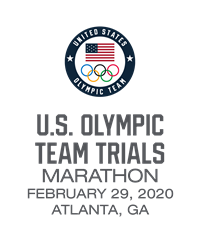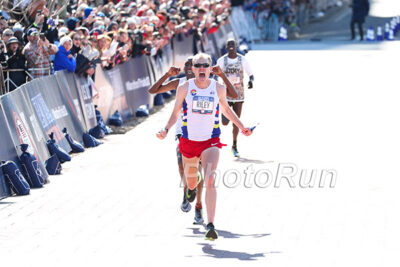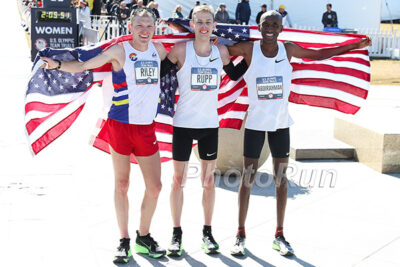Unsponsored Jake Riley Makes All the Right Moves to Earn Olympic Berth in Atlanta
By Jonathan Gault
February 29, 2020
ATLANTA — This time a year ago, Jake Riley was the longest of long shots to make the Olympic team. Though he had run a 2:13 marathon in 2014 and finished 15th at the 2016 Olympic Marathon Trials, Riley was not relevant as an elite runner. After hobbling to a 12th-place finish in the 10,000 meters at the 2016 track trials while battling a nagging Achilles injury, Riley decided he would not race again until he was healthy. It took almost three years, during which time he underwent Achilles surgery, got divorced, and relocated from Michigan to Washington to Colorado.
Today, the unsponsored Riley did more than complete an unlikely comeback; he far exceeded any of his previous performances by running a personal best of 2:10:02 on a hilly, wind-blasted Atlanta course to finish second at the 2020 US Olympic Marathon Trials and earn a spot on the Olympic team.
Working with Australian coach Lee Troop, Riley’s comeback began quietly with a local road race in Broomfield, Colo., in May 2019. In October, he announced himself as an Olympic contender with his 2:10:36, 9th-place finish at the Chicago Marathon. But even after that run, not everyone heard the announcement: in today’s post-race press conference, Abdi Abdirahman — who finished 3rd in Atlanta to earn his fifth Olympic berth — had to pause mid-response to ask for Riley’s name.
Now, everyone will know Jake Riley’s name. And it’s because he trusted himself and stayed calm during the most intense race in America. Time after time, Riley faced tough choices. And time after time, his decisions worked out.
The pivotal moment in today’s race came at 15 miles. Eventual winner Galen Rupp was beginning to push the pace up front, and Riley had to decide whether to follow. After sizing up who was going with Rupp and who was not — and observing that the latter group included pre-race favorites Jared Ward and Scott Fauble — Riley decided to hang back, trusting that most of the men in front of him would fade.
As the gap ballooned — Riley was 39 seconds behind 3rd place at 20 miles — he began to doubt himself.
“Going out Peachtree [Street] the last time, I was regretting that decision a little bit,” Riley said.
But when he began to surge at 19 miles, he saw the men in front of him starting to struggle and knew he had made the right choice, eventually running down everyone but Rupp.
Another of Riley’s decisions came months before today’s race. When Riley ran his 2:10 in Chicago, he did not have a shoe sponsor, choosing to race in Nike’s Vaporfly Next%’s. After his breakthrough, Riley, who is currently studying for his master’s in mechanical engineering at the University of Colorado, received some interest from shoe companies. But he also really liked how the Next%’s felt in that race — he famously said they felt like “running on trampolines.” He decided that, unless a company made a big offer, he wanted to retain the flexibility to race in the Next% at the Trials.
“We’re not going to give away the farm just to have a name on my jersey,” Riley said. “…There were only a couple people that were mildly interested, and no one really wanted to make a significant commitment.”
Instead, Riley chose to bet on himself, entering the Trials unsponsored with the knowledge that, if he ran well, he’d earn an even bigger deal. And it paid off.
Riley didn’t end up racing in the Next% though. He took advantage of Nike’s offer of a free pair of their newest model, the Alphafly, to all Trials qualifiers, and after trying out the shoes on Friday, decided he liked them better than the Next% — despite never training in the Alphaflys before this week. Once again, Riley’s risk paid off.
Riley’s final decision could have been his most costly. With around 600m to go in the race, volunteers were handing out small American flags to the top three athletes. Riley grabbed one (Abdirahman, whom he was running with, did not). With 2016 Olympian Leonard Korir charging hard just a few seconds behind him, it was a potentially risky decision.
“I regretted after I took it,” Riley said. “I was like, ooh, I’m kind of calling my shot right now.”
But Riley also knew he had one more gear left, and figured if Korir was feeling good, he would have closed the gap on Riley and Abdirahman by that point already. Like all of Riley’s choices this week, it worked out fine in the end.



